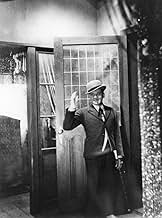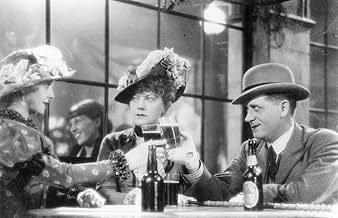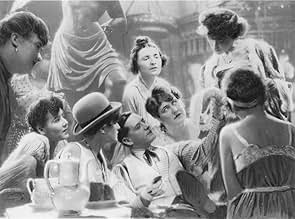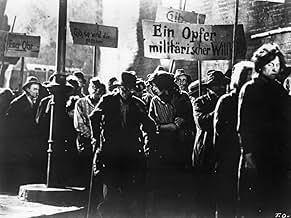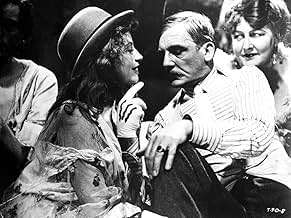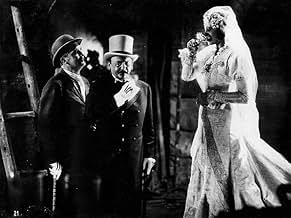Im London der Jahrhundertwende heiratet der Bandit Mack the Knife Polly ohne das Wissen ihres Vaters Peachum, dem "König der Bettler".Im London der Jahrhundertwende heiratet der Bandit Mack the Knife Polly ohne das Wissen ihres Vaters Peachum, dem "König der Bettler".Im London der Jahrhundertwende heiratet der Bandit Mack the Knife Polly ohne das Wissen ihres Vaters Peachum, dem "König der Bettler".
- Auszeichnungen
- 1 wins total
- Jenny
- (as Lotte Lenja)
- Polly Peachum
- (as Mlle. Florelle)
- Smith
- (as Wladimir Sokoloff)
- Chanteur de rues
- (as Bill-Bocketts)
- Mendiant
- (as Gaillard)
Empfohlene Bewertungen
I've seen Die 3groschenoper a number of times now, but this was my 1st visit to the French version, my first impressions being favourable as it is an exact scene-for-scene re-run after all - for the story refer to everyone's comments for 3G. The French runs 7 minutes faster - is that just down to the language differences? I wonder how many of the background extras acted in both (and did they get paid for 2 movies!), but the speaking parts of course were handed to French actors and actresses - the whole reason why this talkie was made. I can almost get by in French - but German is a real tongue-twister for me, so to me a lot of the earthy harshness and Weimar cynicism is lost here for a typically French airy artiness, even down to the song lyrics. Without that overpowering cynicism it becomes for me simply a very good film, not a great one like the simultaneous original. Otoh it's easier to follow, meaning it enlightened me on some aspects of the German release I'd struggled over. Here, in the English translation of the French the people in the shadows ultimately "melt away" - I prefer the "lost to sight" translation of the German. Etherial compared to material.
If you enjoyed 3G then you're sure to enjoy this. Overall, for an Englishman a very enjoyable (French) curio, but for instance if I ever feel that I need a shot of Cynical Sleazy Singing I'll be heading back to Ernst Busch, Carole Neher, Lotte Lenya and Co.
And I write this from a country that experiences an eerily similar situation almost a century later, is ravaged by recession, well-to-do people of three years ago are now sleeping in benches, and that horror and despair has brought actual neo-Nazis in the parliament and racial hate in the streets. So, this hits unexpectedly close to home, and makes me lament that we don't have talents of Pabst's calibre.
Ingenious moments in this extremely cynical vision of a world ruled by money include a 'king of beggars' who runs a powerful beggar-union of fake beggars, and a crook who is sprung from prison only to discover he is president of a London bank.
Pabst plays free and loose with Brecht's text, drops several musical numbers, and makes at least two powerful additions of his own: his ire is aimed at both left and right, with the beggar-union clearly standing in for socialists (their slogans include "give to be given back") who exploit the despair of the people for petty gains, and goes on to show a public riot (only threatened in Brecht) that ends not in triumphant Soviet-revolution but failure and obscurity.
The guy (with his team of close collaborators) was a genius, just not necessarily in this field.
Individual scenes are superb, but the whole feels sluggish and protracted. Scenes open several moments before we need the information and end several moments later. And for a film like this, you need a Marx Bros - Dr. Strangelove madcap rhythm to keep the zap of ferocious energy from dissipating.
But you just need to look at the opening to see what these guys were capable of, what astounding visual language they had refined.
The sparsity works because they're not going for comedic effect yet. It could be the opening to any type of film, say a melodrama. We are introduced to our crook through a public show in the Italian manner, sung and pointing to illustrated panels of the action (our film), and go on to meet him as he courts and swiftly convinces a young girl to marriage. All of that happens in a matter of minutes, no more than four scenes tops. There is a minimum of dialogue. The courting - a dance of seduction - happens in a dance club, and is actually shown as other couples dancing. We don't hear what he says to her, only lips moving. We only find out later (maybe) when she sings about it.
Pabst was the master of allusive filmmaking in the late silent era. You just can't afford to miss his Diary of a Lost Girl.
These days, Eisenstein is the backbone of MTV. You can see Riefenstahl's mark all over the coverage of sports and public events. Expressionism has been made cute and pop. Unlike them, this mode of using a scene to portray unseen bits of narrative that would have been wholly ordinary if simply shown is still new and untapped.
5 out of 5 - Essential
"Die 3 Groschen-Oper" is a cynical musical with low-life characters in the underground of London written by Bertold Brecht and directed by Georg Wilhelm Pabst. This film was released in Berlin on 19 February 1931 and I saw a DVD with a matrix that was restored in 2006 for the 75th anniversary of this film. In 1986, the Brazilian composer Chico Buarque de Holanda and the director Ruy Guerra released an adaptation of this musical with the successful "Ópera do Malandro", the most expensive Brazilian production until 1986, but without the credit to Bertold Brecht. My vote is eight.
Title (Brazil): "A Ópera dos Três Vinténs" ("The Opera of Three Pennies")
Wusstest du schon
- WissenswertesThe film was banned by the Nazi Party in 1933 and prints of the film were destroyed. The film was restored and reconstructed in the 1960s.
- Zitate
Peachum: You too wish to be part of this splendid occasion. You, poorest of the poor, who'd long ago have perished in the sewers of Turnbridge if I hadn't spent sleepless nights devising a way to wring a few pence out of your poverty. For I've shown that the rich of this world have no qualms about causing misery but can't bear the sight of it. They have hard hearts but weak nerves. Well, we won't spare their nerves today! By the thousands we'll tear at their nerves, for our rags do not conceal our wounds!
- Alternative VersionenThere is an Italian edition of this film on DVD, distributed by DNA srl, "L'OPERA DA TRE SOLDI (1931) + HANGMEN ALSO DIE (Anche i boia muoiono, 1943)" (2 Films on a single DVD), re-edited with the contribution of film historian Riccardo Cusin. This version is also available for streaming on some platforms.
- VerbindungenFeatured in Nur zum Spaß, nur zum Spiel (1977)
- SoundtracksLa Complainte de Mackie
(Die Moritat von Mackie Messer)
Music by Kurt Weill
German lyrics by Bertolt Brecht
French lyrics by André Mauprey
Performed by Florelle
Top-Auswahl
- How long is The Threepenny Opera?Powered by Alexa
Details
- Erscheinungsdatum
- Herkunftsländer
- Sprachen
- Auch bekannt als
- Die 3 Groschen-Oper
- Drehorte
- Produktionsfirmen
- Weitere beteiligte Unternehmen bei IMDbPro anzeigen
- Laufzeit1 Stunde 44 Minuten
- Farbe
- Seitenverhältnis
- 1.20 : 1
- 1.33 : 1
Zu dieser Seite beitragen


